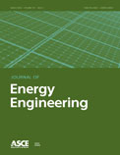
JOURNAL OF ENERGY ENGINEERING
Scope & Guideline
Advancing Sustainable Solutions in Energy Engineering
Introduction
Aims and Scopes
- Energy Conversion and Utilization:
Research on the conversion of various energy forms, including thermal, mechanical, and chemical energy, into usable power. This includes studies on combustion engines, fuel cells, and renewable energy systems. - Sustainable Energy Technologies:
Focus on the development and optimization of sustainable energy systems such as solar, wind, geothermal, and bioenergy. This area emphasizes reducing environmental impacts and improving energy efficiency. - Energy Storage Solutions:
Investigation into various energy storage technologies, including batteries, pumped hydro storage, and thermal storage. The research aims to enhance the efficiency, capacity, and longevity of storage systems. - Thermal Management Systems:
Studies involving heat transfer, thermal performance, and management strategies in energy systems, particularly in buildings, power plants, and automotive applications. - Modeling and Simulation Techniques:
Development and application of numerical models and simulations to analyze energy systems, predict performance, and optimize operational strategies. - Environmental Impact Assessment:
Research focused on evaluating the environmental impacts of energy production and consumption, including emissions analysis and lifecycle assessments. - Hydraulic and Geomechanical Engineering:
Exploration of hydraulic fracturing, reservoir management, and geomechanical behavior in energy extraction processes, particularly in oil and gas industries.
Trending and Emerging
- Integration of Renewable Energy Sources:
There is a growing focus on the integration of various renewable energy sources into existing energy systems, including hybrid systems that combine solar, wind, and other renewables. - Advanced Battery Technologies:
Research on battery technologies, particularly lithium-ion and solid-state batteries, is trending due to the increasing demand for efficient energy storage solutions in electric vehicles and grid applications. - Smart Grid and Energy Management Systems:
Emerging studies emphasize the development of smart grid technologies and energy management systems that optimize energy distribution and consumption through advanced analytics and real-time data. - Carbon Capture and Storage (CCS) Technologies:
An increase in research dedicated to carbon capture, utilization, and storage reflects the pressing need to mitigate climate change impacts, particularly in fossil fuel-dependent economies. - Decarbonization Strategies:
Studies focusing on strategies for decarbonizing energy systems, including policy frameworks and technological innovations, are gaining momentum as nations strive to meet climate commitments. - Artificial Intelligence in Energy Systems:
The application of AI and machine learning in optimizing energy production, consumption, and predictive maintenance is an emerging trend, enhancing operational efficiency across various sectors.
Declining or Waning
- Traditional Fossil Fuel Technologies:
Research focused on conventional fossil fuel extraction and combustion processes is becoming less prominent as there is a growing emphasis on renewable energy and sustainability. - Coal Utilization Techniques:
While historically significant, studies specifically targeting coal combustion and processing technologies are decreasing, likely due to a global shift towards cleaner energy sources. - Nuclear Energy Studies:
Research related to nuclear energy systems has seen a decline, possibly due to the increasing focus on renewable energy sources and public concerns about nuclear safety. - Conventional Hydraulic Systems:
The exploration of traditional hydraulic systems in energy applications is becoming less frequent as new technologies and methodologies emerge, focusing more on advanced materials and renewable systems. - Emissions from Conventional Fuels:
With the move towards cleaner alternatives, research specifically targeting emissions from conventional fossil fuels is waning, as the field shifts towards comprehensive emission reduction strategies.
Similar Journals

Journal of Power Technologies
Advancing Sustainable Power TechnologiesJournal of Power Technologies is a prestigious academic journal dedicated to advancing the field of power engineering, specifically focusing on innovative technologies and methodologies related to energy production, transmission, and efficiency. Published by the renowned Warsaw University of Technology, Institute of Heat Engineering, this journal is committed to disseminating high-quality research that addresses the challenges and opportunities in the energy sector. Although currently not open access, the journal provides extensive subscription options for access to its comprehensive range of articles. With an emphasis on original research, case studies, and reviews, the Journal of Power Technologies serves as a vital resource for researchers, practitioners, and students alike, aiming to shape the future of sustainable power systems and contribute significantly to the global energy discourse. The journal continues to foster an academic environment where innovation in power technology is highlighted and celebrated, supporting the ongoing quest for sustainable energy solutions.

Energy Science & Engineering
Connecting Knowledge for a Greener TomorrowEnergy Science & Engineering, published by WILEY, serves as a leading open-access platform for the dissemination of high-quality research and insights in the fields of energy science, engineering, and safety. Since its inception in 2013, this esteemed journal has gained recognition for its impactful contributions, reflected in its impressive impact factor and notable Scopus rankings. As of 2023, it holds a distinguished Q2 category ranking in both Energy (miscellaneous) and Safety, Risk, Reliability, and Quality, showcasing its vital role in advancing interdisciplinary collaboration and innovation. With an open access model, the journal ensures that groundbreaking research reaches a wide audience, fostering discussion and knowledge sharing across academia and industry. The scope of the journal encompasses cutting-edge topics related to energy efficiency, renewable energy technologies, and risk management, making it an essential resource for researchers, professionals, and students aiming to contribute to the evolving landscape of energy science and enhance societal sustainability.
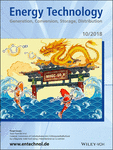
Energy Technology
Exploring Breakthroughs in Energy TechnologyEnergy Technology, published by Wiley-VCH Verlag GmbH, is a prominent peer-reviewed journal dedicated to advancing the field of energy research and technology. With an ISSN of 2194-4288 and an E-ISSN of 2194-4296, this journal has made a significant impact in the energy sector, holding a Q2 category ranking in the Energy (miscellaneous) category for 2023, and proudly positioned in the 77th percentile within the Scopus ranking for General Energy. Since its inception in 2013, Energy Technology has consistently published cutting-edge research, innovations, and reviews that cater to a wide array of topics including renewable energy, sustainable technologies, and energy efficiency. The journal does not offer open access, yet it remains a key resource for researchers, professionals, and students who are committed to exploring the dynamic field of energy. The journal's efforts to disseminate rigorous scholarship make it an invaluable asset for anyone looking to contribute to or understand the future of energy-related technologies until 2024.

Frontiers in Energy Research
Empowering sustainable energy solutions through research.Frontiers in Energy Research is a prestigious open-access journal published by FRONTIERS MEDIA SA, dedicated to advancing knowledge in the diverse fields of energy research. Launched in 2013, the journal has established itself as a pivotal platform for disseminating high-quality research, particularly in areas such as Economics and Econometrics, Energy Engineering and Power Technology, and Renewable Energy, Sustainability and the Environment. With a notable impact factor and impressive quartile rankings, including Q2 in multiple categories and a reputation for rigorous peer review, Frontiers in Energy Research offers researchers, professionals, and students alike a vital resource for exploring the latest innovations and insights in energy studies. Operating from its base in Lausanne, Switzerland, this journal is committed to enhancing open accessibility to relevant research, significantly contributing to the global dialogue on energy solutions and sustainability.
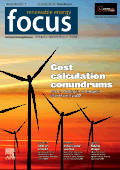
Renewable Energy Focus
Fostering Groundbreaking Research in Renewable EnergyRenewable Energy Focus is a premier journal published by Elsevier, dedicated to advancing the field of renewable energy and sustainability. With an ISSN of 1755-0084 and an E-ISSN of 1878-0229, this journal serves as a vital platform for researchers, professionals, and students interested in innovative solutions to energy challenges. Established in 2007, the journal has evolved to become a recognized authority in the subject area, currently ranked in the Q2 quartile of its category for 2023, emphasizing its significance in promoting impactful research. The journal encompasses a wide range of topics, including solar, wind, bioenergy, and sustainable practices that contribute to environmental conservation and energy efficiency. As part of Elsevier's commitment to disseminating high-quality research, Renewable Energy Focus is indexed in Scopus, currently holding a rank of #92/270 in the energy sector, positioning it in the 66th percentile of its field. This journal offers an essential resource for those dedicated to fostering sustainable energy solutions.

Joule
Transforming Energy Insights into ImpactJoule, published by CELL PRESS, is a premier journal dedicated to the rapidly evolving field of energy research. Since its inception in 2017, Joule has established itself as a leading source of high-impact studies in energy, achieving an outstanding Q1 ranking in the Energy (miscellaneous) category and ranking #1 out of 73 in the general energy field, placing it within the 99th percentile according to Scopus metrics. The journal aims to advance the understanding of diverse energy forms and their applications, providing a platform for significant breakthroughs that can drive sustainable practices and innovative technologies. Through rigorous peer review and expert contributions, Joule serves as an invaluable resource for researchers, professionals, and students engaged in tackling some of the most pressing energy challenges of our time. Based in the United States, Joule continues to foster collaboration and interdisciplinary approaches in energy research, striving to illuminate pathways toward a sustainable future.

Frontiers in Energy
Empowering Sustainable Solutions for Tomorrow's Energy Challenges.Frontiers in Energy is a distinguished journal published by HIGHER EDUCATION PRESS, focusing on the dynamic and rapidly evolving field of energy engineering and power technology. Established in 2011, the journal serves as a pivotal platform for disseminating innovative research findings and practical applications that address critical challenges in energy systems. With an impressive Q2 ranking in 2023 and a Scopus rank of 81 out of 272 in the discipline, it highlights the journal's influential impact within the academic community, reflecting its commitment to high-quality research. Based in Beijing, China, the journal aims to promote open and accessible scientific discussion, facilitating collaboration among researchers, professionals, and students alike. As an open access publication, Frontiers in Energy ensures that valuable knowledge is readily available to a global audience, effectively contributing to advancements in sustainable energy solutions. Join the forefront of energy innovation by engaging with cutting-edge research that shapes our energy future.
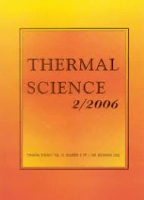
Thermal Science
Transforming energy challenges into sustainable solutions.Thermal Science is an esteemed open-access journal published by the Vinca Institute of Nuclear Sciences in Serbia. With a rich focus on the field of thermal science, this journal has established itself as a vital resource for researchers and professionals interested in the dynamics of energy, renewable energy systems, and environmental sustainability. Since its inception in 2001, Thermal Science has dedicated itself to disseminating high-quality research that addresses the challenges of contemporary thermal technologies. The journal has converged its years of publication from 2007 to 2024 and currently holds a Q4 ranking in the category of Renewable Energy, Sustainability, and the Environment, with a Scopus rank of #172 out of 270, placing it in the 36th percentile. This makes it a crucial platform for sharing innovations and findings that contribute to the development of sustainable energy solutions. With open access options available, Thermal Science ensures that knowledge is readily accessible, fostering collaboration and advancement in this critical field.
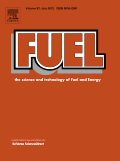
Fuel
Exploring the Future of Energy EngineeringFuel is a premier international journal published by Elsevier Science Ltd, showcasing critical advancements and insights in the fields of chemical engineering, energy engineering, power technology, and organic chemistry. With a significant history dating back to 1922 and continuous publication from 1970 to 2025, Fuel holds an impressive position in the academic community, reflected in its top-tier rankings—Q1 in multiple categories including Fuel Technology and Chemical Engineering for the year 2023. This journal is dedicated to exploring innovative research and application of fuel technologies, driving forward the dialogue on sustainable energy solutions. Researchers and professionals alike will find Fuel to be an essential resource, providing access to high-impact articles that contribute to advancements in methodologies and applications, while navigating the complexities of global energy challenges.
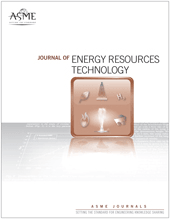
JOURNAL OF ENERGY RESOURCES TECHNOLOGY-TRANSACTIONS OF THE ASME
Fostering collaboration in the realm of energy advancements.JOURNAL OF ENERGY RESOURCES TECHNOLOGY-TRANSACTIONS OF THE ASME is a prestigious journal dedicated to advancing the knowledge and application of energy resources technology across various disciplines. Published by the American Society of Mechanical Engineers (ASME), this journal plays a critical role in fostering innovative research within energy engineering, fuel technology, geochemistry, and mechanical engineering, evidenced by its solid impact factor and commendable Scopus rankings, including a Q1 ranking in Mechanical Engineering. The journal's comprehensive scope covers a wide array of subjects, from renewable energy solutions to sustainability practices, making it an essential platform for researchers, professionals, and students eager to contribute to and stay abreast of developments in the energy sector. With an impressive convergence history dating back to 1979, it continues to uphold rigorous academic standards and provides valuable insights into the latest technological advancements and methodologies relevant to the field. While the journal does not offer open access options, it is unequivocally a vital resource for those engaged in cutting-edge energy research.